-
Posts
4,608 -
Joined
-
Last visited
Content Type
Profiles
Forums
Store
Help Articles
Posts posted by dcarch
-
-
Some what off-topic:
It seems that cultures which have diverse eating habits have much less allergy issues.
I seem to have seen a report that even children with severe peanut allergies can be treated by exposing them to progressively increasing amounts of peanuts ( Warning: Don’t try this at home!!!! Disclaimer:I am not a doctor!!!!).
dcarch
-
It seems to me that gluten is an important part in Asian cooking/diet.
I enjoy mock chicken made of gluten in Chinese shops.
dcarch
-
There are those who really go for a polished edge that can literally split a hair (really, check youtube).
Do you need that for the kitchen?
Here are a few magnified views of a brand new blade for a surgeon’s scalpel.
dcarch
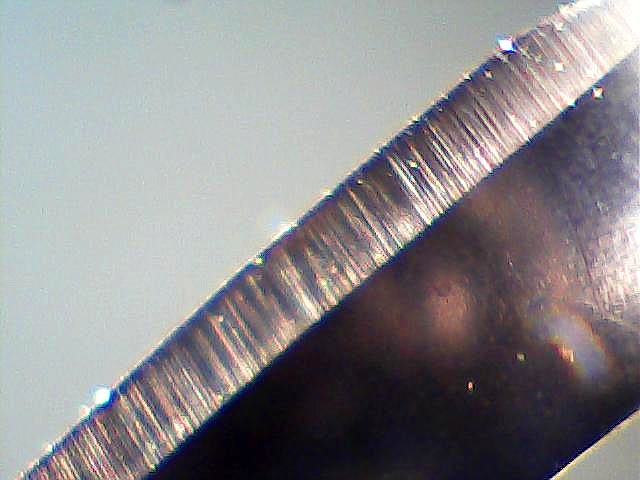
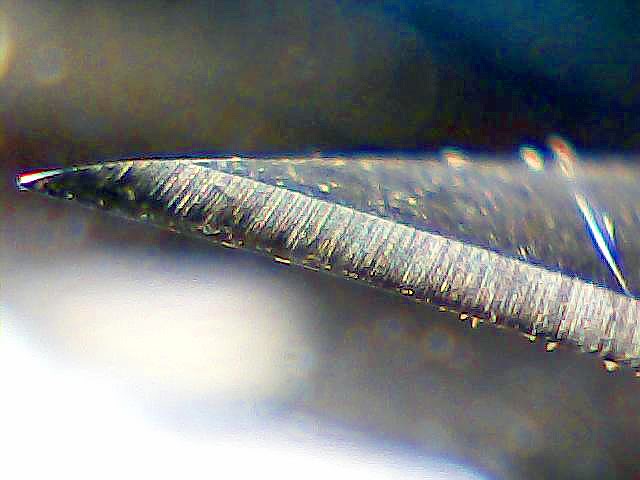
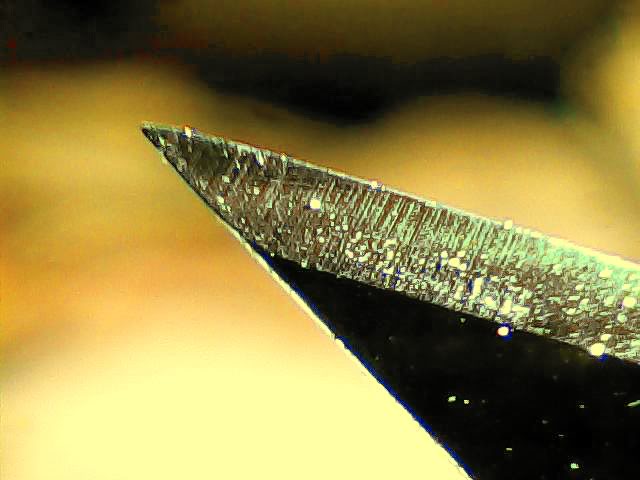
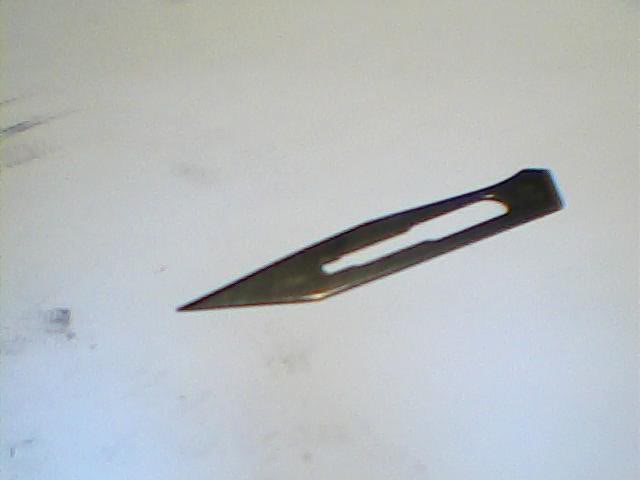
-
Use a torch.
You can get a lot of "outdoor" flavor using a torch.
dcarch
-
-
There are many pre-rubbed, pre-seasoned ribs in plastic.
dcarch
-
Stupid idea to keep your veggies green:
In supermarkets veggie department, and meat department, they use special fluorescent bulbs which have special spectrums to enhance the green color and the red color.
------------
BTW, Kevin Liu has a very good point.
dcarch
-
There must be something else you can do.
I seem to think that veggies in frozen TV dinners stay green, even you cook them a long time.
What have they done to the veggies?
dcarch
-
Percyn – Interesting meal combination, Burrito with Ramen. Looks good and sounds good to me.
Paul Bacino – nice presentation od Caprese Salad.
mgaretz – the sous vide shrimp looks beautiful with home made fettucini.
Genkinaonna – your Corn soup with bacon and cheddar fritters is so professional looking.
ScottyBoy – your Heirloom Tomato Gazpacho is so artistic looking. So is the salmon. OK, you convinced me. I went out and got two pounds of squid.
C. sapidus – I can’t even pronounce the names of your dishes, but I can pronunce that they look fabulous.
weinoo – the roasted quails look wonderful. Two would not be enough for me.
Kim – incredible array of fine dishes, again showing the wide spectrum of your cooking ability.
heidih – I can see the grape leaves indeed can work very well with pork.
Prawncrackers – My two thumbs up for your Squabs.
SobaAddict70 – very fine-looking Ratatouille. OMG! Heirloom tomato salad, with watermelon and white peaches, that is what summer is all about !
--------------- - - - - - - - - - - -- -
I am happy to see Pollock in the fish market. I don’t know why they don’t have it more often here. It is a very nice fish.
dcarch
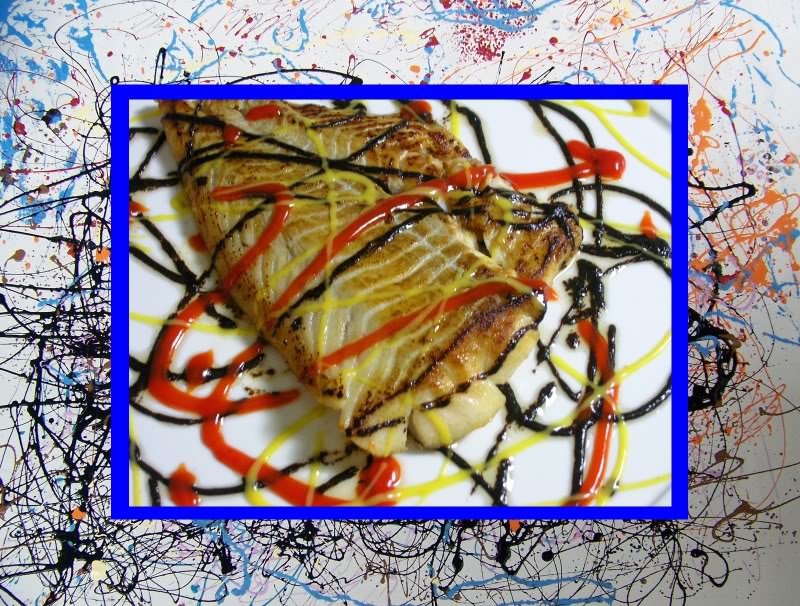
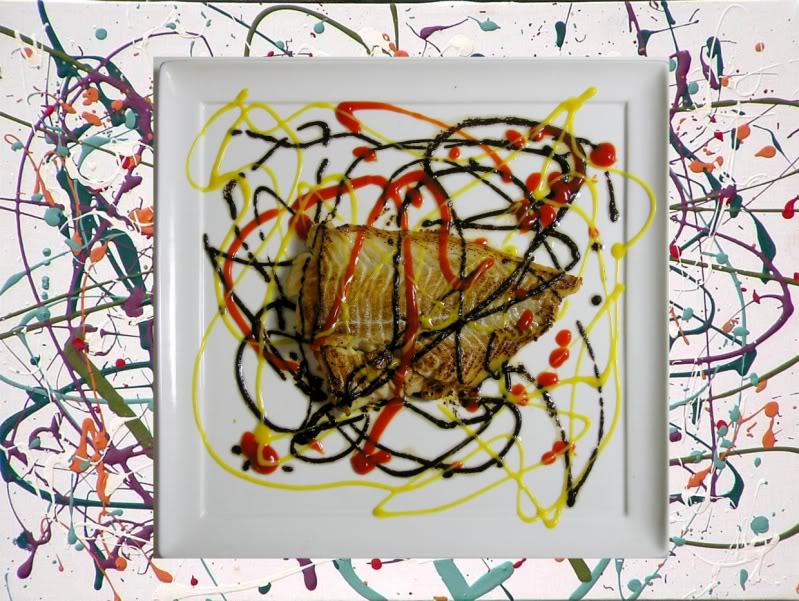
-
We all have different body immunological responses. It’s up to you.
I grew up in an area with no refrigeration, eating smelly food all the time. (Lots of powerful seasoning to cover up the smell)
Now, for myself, if the meat kind of stinky and kind of slimy, I just wash the meat, cook and enjoy.
The only time I insist on 100% fresh meat is when I am making sushi. :-)
dcarch
-
Now you will need a high vaccum pump.
With the interesting clear liquids that you are getting from various foods. Use the high vaccum to boil down the clear liquid at very low temperature to super concentrate the flavor.
You may even be able to crystalize many liquids.
Imagine chicken broth crystals, clearly interesting substance.
dcarch
-
How about a clear carbonated beef stock?
It would be lovely to sip beef "soda" thru a straw with a few ice cubes.
Disgusting? How would you know? :-)
dcarch
How about a beef-tini?
Yes, add a shot of Beefeater, centrifuge, not shaken. :-)
dcarch
-
How about a clear carbonated beef stock?
It would be lovely to sip beef "soda" thru a straw with a few ice cubes.
Disgusting? How would you know? :-)
dcarch
-
We have a brand new Chinese buffet in our little town. I probably won't be going back, mostly because the food is not too great, but also because they play the local Christian station on the sound system.
It isn't because I hate hymns or Christians--it is because I object to the station's comments on political things on their 'news' segments.
I had to laugh a little." Buffet ---- food is not too good?" LoL. I am very surprised!!!
Sorry :-)
That altar in many Chinese restaurants, as I understand, is not any kind of organized religion. It is more of a superstition. Supposedly, it will bring good luck and lots of money.
dcarch
-
Why?
Cleavage?
False eyelashes?
dcarch
-
The cleanest water is actually in your toilet tanks.
Don't flush if your water supply is disrupted.
dcarch
-
Ugly tomato, transformed into a beautiful Appetizer course!
Ugly crustacean, metamorphosed into a gorgeous spaghetti with lobster dish!
Magical!!!!
dcarch
-
I don't see stocking up food and water. Power outage due to storms don't generally last for too many hour. I don't remember water was cut off due to storm unless you have a pump and well. You are not talking about a major earth quake. Do fill your gas tank if your tank is not full. Gas stations cannot work with power out.
Do check in advance where you can get dry ice in case the power does not come back before the food in the freezer is about to thaw.
If you find your food in the freezer thaws too quickly, your refrigerator is defective or has very poor insulation to begin with. Replace it soon. You have been wasting a lot of electircity all along.
If you don't have a backup generator, get a small 12v inverter. A 400 watt inverter is around $30.00. Plug in the inverter in your car and let the engine idle (outside), with an extension cord, you can have TV, e. mail, computer, a light, charger for you phones, etc for many hours.
Depending on your car's generator, you can get a bigger inverter to run your refrigerator.
dcarch
-
here's an interesting link
Good link.
Here are the issues:
Most material has some hydroscopic properties. Wood, paper, potato chips, --- even plastics. The question is how much.
Salts are well known for their very strong affinity to water, they are very hygroscopic, so much so that they are used frequently as desiccants. Many salts, such as snow melting salts, if you don’t cover the bag, they will soon absorb so much water that they liquefy into a puddle of water that they absorb, which is known as Deliquescence.
If you put salt, a strong hygroscopic substance next to rice, guess which way the water is going to go.
For argument’s sake, let’s say rice is a stronger absorber of water than salt, in a salt shaker, which is open to moisture in air, how can it keep on absorbing water like a perpetual motion machine? There is no known desiccant that can last forever, certainly not an extremely weak one like rice.
dcarch
-
OK! Look, I just found this:
http://en.wikipedia.org/wiki/Sodium_chloride
Sodium chloride,
"-----Sodium chloride is sometimes used as a cheap and safe desiccant because of its hygroscopic properties, making salting an effective method of food preservation historically; the salt draws water out of bacteria through osmotic pressure, keeping it from reproducing, a major source of food spoilage. Even though more effective desiccants are available, few are safe for humans to ingest.---"
As I suspect, when you put rice in salt, actually the salt is keeping the rice dry, not the other way around.
Salt is much stronger in grabing moisture than rice.
dcarch
-
I use kosher salt and never use a salt shaker, so I never have the salt clumping issue. However, I always, always pack my meat grinder parts in dry rice in a Ziploc bag. Before I did this, I would wash the metal parts and dry them and they still managed to get slightly rusty/oxidized from humitity. Now, I dry them somewhat and then into the rice bag they go. They come out perfectly dry and pristine when I need to use them. So could I believe the solution to the initial question is simple:
Rice is dry. Put it in an environment where it has less water content than its surroundings, and water will move from where it is in high concentration to where it is in low concentration i:e rice.
In fact, although I'm no camper and have never done it, my backpacking friends tell me that in the morning, they routinely put regular raw, dry rice into a plastic bag, add water, and then set out on their hike. They tell me that the rice does not need to be cooked. It only has to be in the water. It soaks up all the water and is ready to eat by dinnertime.
Soaking something in water until it is puffed up wet is not considered desiccant in action or it is hygroscopic. I think that is more capiliary or osmosis in action.
If you leave salt in open very humid air it can have such strong afinity to draw in moisture that it will eventually melt in a puddle of water it absorbs. I seem to think that salt’s hydroscopic ablity is much stronger that rice, therefore it may actually be keeping the rice dry, not the other way around.
Nevertheless, the key question needs to be anwered is, where does rice keep all the water it draws in if it can continually keep the salt dry?
dcarch
-
andiesenji, "---Obviously other people have been using this solution to a nagging problem for at least a century, probably much longer, but as I have had this discussion with people who had been around that much longer than my 72 years, and I did a basic Google search and found thousands of sites that note this remedy for the problem, I figure it has worked for many others.---"
Note that my question is not if rice works to make salt flows better.
I am only questioning if rice acts as a desiccant.
A salt shaker is open to the atmosphere, normal atmosphere has infinte moisture content. Can rice keep on absorbing water indefinitely? Where do all the water absorbed go?
dcarch
-
Mjx, "---Wouldn't the humidity in the enclosed space of a salt shaker, especially if it's made of something relatively non-porous, reach higher levels than what you'd get outside, even on a really humid day?---"
Good question. Because of moth problems, my rice is always baked in the oven and then kept in air-tight containers, in sealed plastic bags. Even 11.11 oz ( a lot more than those few grains of rice in a shaker) of very dried rice in a very humid day did not absort any noticeable moisture.
a. I think the main function of rice in salt sakers is to un-clump salt by impact.
b. In an open container such as a salt shaker, the rice will reach maximum moisture soon and cannot possibly keep on absorbing moisture forever. Where would the moisture go?
c. In order for the rice to extract moisture from the salt, it has to have higher affinity chemically to water then salt. In general I think salt has a stronger attraction to H2O than rice. Infact, the salt is probably keeping the rice dry, and the salt is also keeping the rice from getting moldy. Hence, when you look at the rice in a salt shaker, it's so dry and nice, giving the impression that rice is a good drying agent.
I am under the impression that even chemical desiccant packs work only once, and in a tightly sealed container.
dcarch
-
In another thread, it was mentioned that rice can be used to keep salt, spice, etc. dry.
I just cannot understand how rice can act as a desiccant. It does not have any hygroscopic substance in its composition, no more than any other similar organic material.
Rice in the open may absorb some moisture in the air depending on relative humidity, and once it is at that point, it cannot take in any more moisture. The amount of moisture it can take in based on humidity, I would think is extremely small.
As an experiment, I put some fairly dry rice in a container and measured the rice on a digital scale, the scale measured 11.11 oz.
I took the rice outside in extremely humid air, and left it there for two days and one night.
I immediately measured the rice again, it read 11.11 oz. apparently it had not gained more than 0.009 oz (resolution of my scale).
Is this another kitchen myth?
dcarch



The gluten thing
in Food Traditions & Culture
Posted
Many Asians are ideed lactose intolerant as well as alcohol intolerant.
I my spending time in the Far East, I had not come across allergy issue like here in the US. I have many Asian friends, none of them has allergies, except one is allergic to shellfish.
To me, the US has terrible eating habits when it comes to varieties. We are much better now. Meats, vegetibles, fish, fruits ----- there are so many things we don't have and don't eat.
dcarch